What is keyword research?
Talking to potential customers is the best way to learn how people look for your services.
The more people you talk to, the more obvious it becomes.Talking to hundreds of potential customers may not be possible.
For example, when we talk to our customers they talk about “digital marketing“
When you talk to customers, you understand the language they use to find your business type.
So what is a more effective way to learn this language your customers use?
Keyword research.
Keyword research is the process of discovering search terms that your target customers type into search engines to find your services or products. People type different keywords during different stages of the search. Keyword research makes it easy to capture customers at all parts of the marketing funnel.
This page outlines keyword research for beginners.
Is keyword research still important ?
Keyword research helps you write about topics that have interest. Demand is often measured by the number of times a keyword is searched. The more the searches the more the demand.
If you write content that no one is searching for then you will get no traffic to the page.
End users that use our SEO services often ask why do keyword research?
It is predicted that over 90% of the web pages don’t get any traffic from Google. Google is the biggest search engine in the world.
Keyword research is very important because it serves two specific purposes
- You write on topics because there is demand. It helps validate demand.
- You use the right keywords in your content that matches what people are searching thereby having an ROI on your content. A consistent stream of web visitors follows.
How to find keyword ideas?
There are a number of ways of generating keyword ideas initially. None is better than speaking to your audience directly.
Speaking to your audience gives you the opportunity to understand their language.
If this is not directly available to you, I would recommend the three step methodology
- Start with the most obvious list of keywords you can think of. These include keywords that you believe people look for when they look for your type of business. We call them seed keywords.
- Next, using different keyword tools analyze what your competitors are using as their main keywords. The bigger and more prominent the competitor the better. You can even use tools like Google keyword planner to extract their best keywords. (more on this later)
- Use subreddits, forums and other classified sites to look up terms that people are using to list products or services that you sell. These include identifying category naming classified use and reports like trending products.
Broad keywords
The most obvious place to start is to think about some words that define your services. Make sure you go as broad as possible.
Broad keywords define your niche or the general category of your type of businesses. The broad keywords category also helps identify your potential competitors.
SEO with a search volume of 14,800 in Australia is the most broad keywords in our category.
Some other keywords are
- seo agency
- seo company
- seo consultant
- seo expert
- seo optimisation
- seo optimisation
- seo packages
- seo services
Google ads keyword planner asks you a search term before it will make other suggestions. Other SEO keywords research tools will also follow the same pattern.
Broad keywords are also the type of keywords you want to rank for in the future. Depending on your budget and content strategy, you should aim to rank your broad keywords in Google in 12-24 months time.
Note that the broad keywords have a lower intent. “expert seo services” has a much higher buy intent compared to “SEO”.
A university professor may be doing research when they type in the term “SEO”. A candidate may be preparing for an interview when they type in the term “SEO”.
It is a good idea to place the broadest keyword in the topmost row of your sheet. You should not focus on ranking it in the first few months of your strategy.
Start with the site: competitor.com search in Google
Simply head over to google and type in site:competitor.com This google search will give you a list of all pages that Google has in their index for the site competitor.com.
Do not worry about extracting all these results in excel or CSV. We can do that later using Screaming Frog. We will first start by observing the language, titles, description, URL structure to get a feel of their narrative.
Tip: Titles & descriptions in search results reveal what the competitor is targeting the specific page for. If the page title says, Best SEO Company Melbourne, then they are targeting variations such as
- Best SEO Company
- SEO Company
- SEO Company Melbourne
- SEO
Visit the page to discover their positioning and value props
Visit their website and make a list of headings on the homepage.
You can also use a chrome plugin called Web Developer to get a list of all the titles of the page.
Visiting the Shopify homepage and running Web Developer > Information > Document Outline yields the following
As you can see the type of language as well as the keywords that this business is targeting.
Their H1 titles seem to imply some value props namely
- Start your business using Shopify
- Sell everywhere
- Market your business
- Manage everything
- Award-winning customer support
- Access to experts
Your competitors keywords
If you have a prominent competitor, you can simply give Google ads keyword planner its URL.
Google provides a volume of search for each keyword in their Google ads account. This makes it easier for advertisers to target keywords. This information is also a goldmine for SEOs because we can use the volume of searches to drive our strategy.
Using this tool, we can find all the keywords your competitors are using.
You will need access to a Google ads account.
Ideally, if you have access to an ads account that is already running ads, you will see accurate volume numbers. If not, you will see a range.
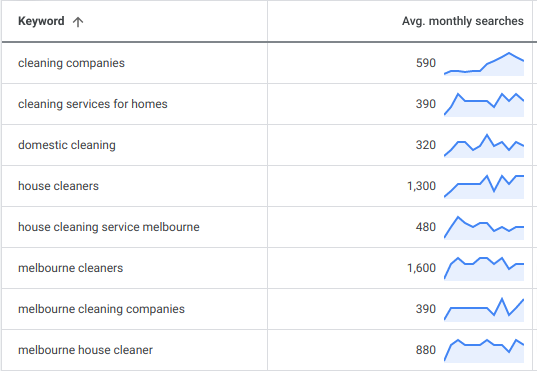
Once you have access, head to Google Ads > Tools & Settings > Keyword Planner > Discover new keywords.
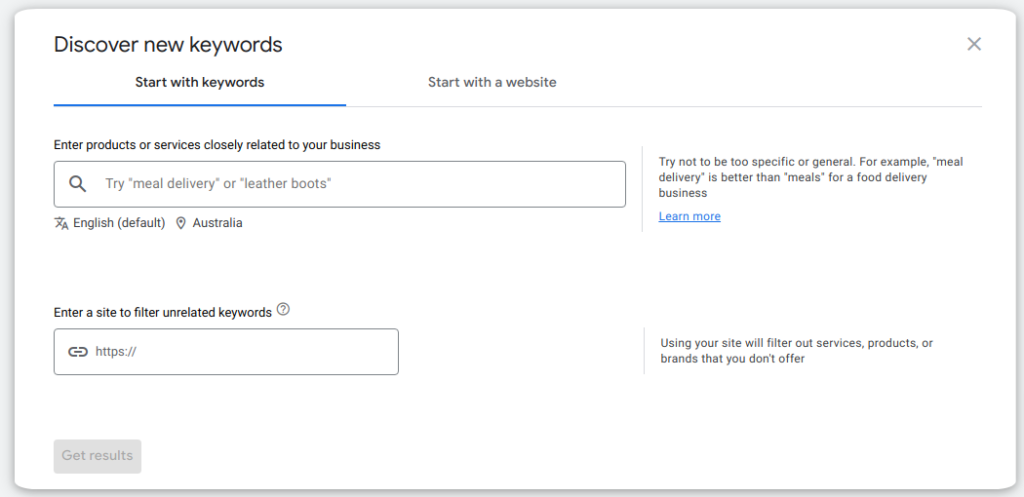
Start with a website and simply put in your competitors URL.
Here is an example of the output for a competitor
Now it is possible that you may perceive someone as your competitor but you don’t compete with them. The best way to identify your competitor is to identify those that compete with you on the following parameters
- Location
- Primary product
- Domain extension
- Content
Sites like backlinko rank for SEO but are not competitors because they don’t provide SEO services.
You should rinse and repeat the above process for all competitors’ sites and make a list of words that intersect in all competitors.
Now a lot of guides on keyword research suggest looking at top page reports on your competitors’ sites. I don’t recommend doing it.
Your competitors’ top pages are often blog pages or are those pages with low relevance. You should focus your keyword research on primary topics before you embark on broadening your reach with keywords.
Subreddits and classifieds
Subreddits: It’s also a good idea to see what people are talking about in subreddits that are related to the product or service that you are considering offering. This could give you ideas about what keywords you should choose.
Sometimes questions asked in subreddits are a goldmine of information.
On the SEO subreddit, the top rated post of all time is a question about a question.
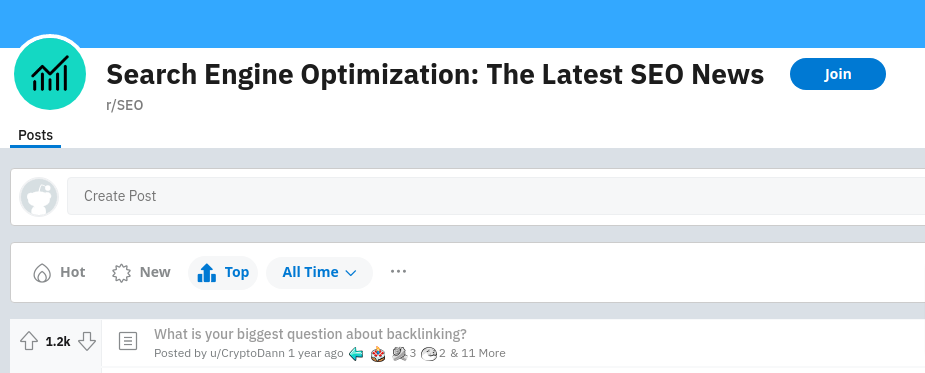
These types of posts are absolutely great at getting to the pain point of your ideal customers.
Here is a question within the question

This question alone tells you that link velocity, spam & penguin are all keyword ideas you should explore.
You can further build on this by doing a subreddit specific keyword search.
Try the following search
Site:reddit.com/r/seo “responsive web design”
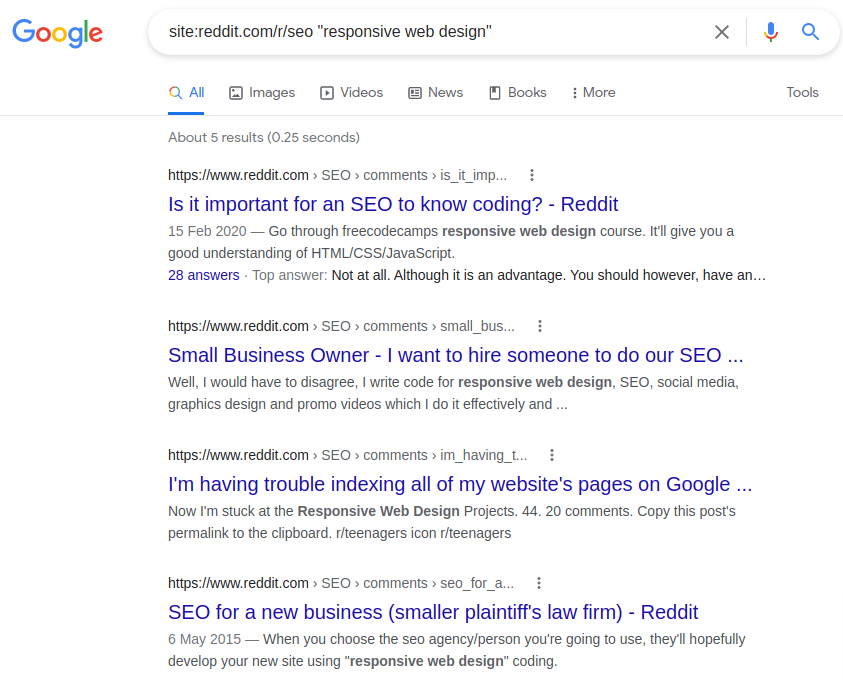
You will notice that the term “responsive web design” comes up often. This means that the likelihood of these terms being closely related to each other is high.
You would need to integrate these keywords into your own keywords strategy.
Classifieds: Looking at how classified ads on Gumtree or Craigslist tend to be worded can help you figure out what keywords are most likely to be used by the target audience. It’s especially important to look at the titles of classified ads on classifieds.
Gumtree has a popular items section

This is based on user searches on the Gumtree platform.
How to analyze keywords?
We will want to find keywords that have between 50-2000 search volume.
The reasons for this are many but let’s just think of a few
- Search volume above 2000 attracts larger competition.
- Keywords generally have a cluster of words/topics around them. This will make targeting a few keywords on the same page feasible.
- Search volume lower than 50 generally yields little to no ROI.
- You will need a page for each cluster of words/topics. You cannot target two different topics on the same page.
- At more than 2,000 searches a month, there’s often more competition, requiring more links to rank, so we are starting to move away from the ROI sweet spot.
Now let’s start with the most obvious term that you can think of. In our case – “SEO”
Using the filter on the side, remove keywords that are not relevant.
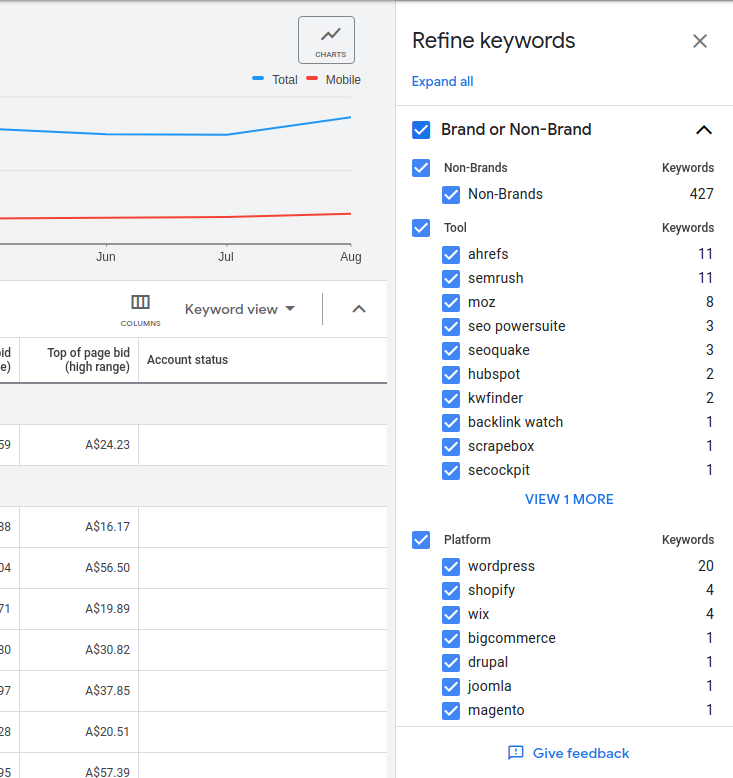
This includes branded searches of competitors, tools and platforms related searches and other low intent searches.
We do this because it is important to have a singular focus in the first stage of keyword research.
Branded terms often belong to competitors or tools that are used by people in the industry.
This leads to a nice big list. Here is an extract of what I got.
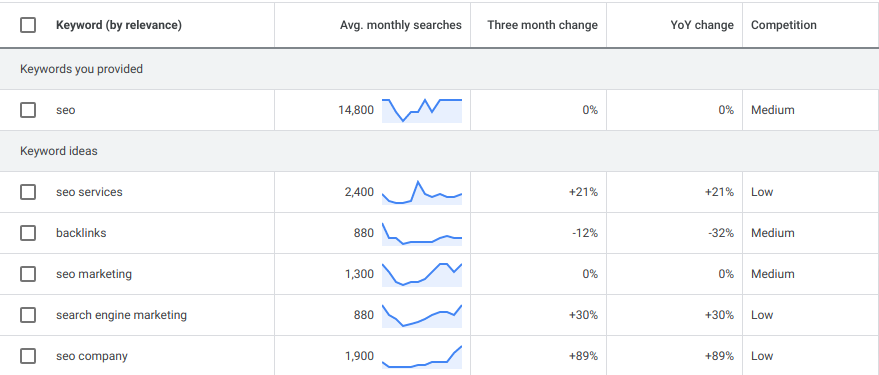
The columns in the Google Ads keyword planner are useful compasses.
- Competition: The competition column indicates the number of advertisers bidding on the term. The higher the competition the lower the traffic received to organic listings. This is because higher competition means there will usually be four ads above the organic listings.
- YOY change: This column indicates the trend year on year. An increase in the YOY numbers bodes well for targeting that specific keyword.
- Avg Monthly searches: The 12-month average of user queries for the keyword on Google search.
- Top of page bid: This is the bid value in dollars an advertiser is paying for being in the top four positions.
Obviously, these will help determine what keywords to keep and what to discard.
My recommendations are to keep keywords with medium to low competition, positive YOY change and great monthly search volumes.
How to target keywords?
To rank for a particular search phrase, you’ll probably want to make a new landing page that laser targets the search phrase topic.
You can repurpose an existing page on your site too.
Your site hierarchy should be based on the keywords you want to rank.
Take the core keywords list and organize them into groups.
These groups will represent the basic sections of the site, and each one should be optimised with keywords.
Now add a category and a relevant URL on your site for each word.
We call this keyword mapping.
Here is an example keywords research sheet of what that mapping looks like.
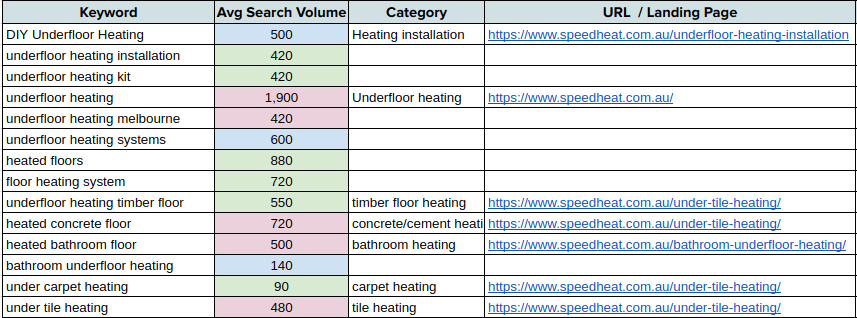
You may need to only go two or three levels deep, or you may need to get much more complex.
The construction of site hierarchy is strongly dependent on the market and business goals (and the SEO benefits of specific keyword markets).
Ideally, for a service business one level deep is usually enough.
Ecommerce can have two or three levels of depth. There’s no right way to set up a site’s hierarchy, and a lot depends on the site’s size.
A 100 page site will have a completely different strategy to a 10,000 page site.
Once you have this sheet, you are done with keyword research.
Keyword research will need to be done every time you gain some traction or rank for existing keywords. It is a never ending process.
What are keyword research tools?
A lot of SEOs will argue that there are other ways of doing keyword research. There are. Yet, none of them are as useful as the Google keyword planner.
Some other keyword research tactics include using the following as tools.
Google Ads Keywords Planner
Google ads keyword planner is the best keyword research tool you can use. The keywords planner from Google is single handedly enough for preliminary keywords research. You can also use it to learn which variation of keywords has a larger search volume. Many SEOs argue that keyword planner hasn’t been useful in a while. However, remember there is only one source of data that feeds the entire internet. Google.
Google Trends
Google Trends can show you what the top trending searches are, and it can show you how many times per day a particular phrase or word is searched on Google. You can also determine whether a search term has become more popular or less popular over time.
Google Auto suggest
Start typing in a word in Google and Google makes recommendations. Pay close attention to what Google is suggesting.
Keyword research for Youtube videos follows the same methodology as above. Except with YouTube videos you don’t need in-depth research.
FAQs about keyword research
How does keyword research relate to SEO?
SEO is the process of optimizing your site to help search engines better understand it’s structure and content. If search engines can understand your website they will rank it higher in SERPs.
Do you recommend a keyword research chrome extension?
The free version of Keywords everywhere usually does the trick.
